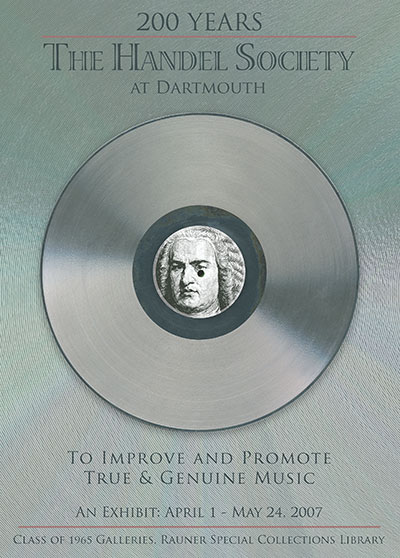Home >
Rauner Library >
Exhibits >
200 Years of the Handel Society at Dartmouth: To Improve and Promote True and Genuine Music
 The exhibition was curated by Barbara Krieger and was on display in the Class of 1965 Galleries in Rauner Special Collections Library from April 1 through May 24, 2007.
The exhibition was curated by Barbara Krieger and was on display in the Class of 1965 Galleries in Rauner Special Collections Library from April 1 through May 24, 2007.
You may download a small, 8x10 version of the poster: Handel.jpg (2.1 MB) You may also download a handlist of the items in this exhibition: Handel.
The Dartmouth College, Handel Society records are organized in the manuscript collection DO-7.
Materials Included in the Exhibition
Case 1. Musical Societies in the Nineteenth Century
- In the mid-1800’s, musical societies in New England saw a surge in popularity. Many musical conventions took place and the Handel Society was invariably invited to participate.
- William How's journal entry for November 4, 1853, discusses the musical convention in Lebanon, New Hampshire, November 1 - 3.
- In his Music in America, published in 1883, Frederic L. Ritter writes:
- Among those musical societies which in the early part of the century were formed throughout New England I consider the Handel Society of Dartmouth - next to the Boston Handel and Hayden Society - the one most beneficial in its influence…some of the best vocal and instrumental musicians have been sent forth from Dartmouth's Handel Society to various parts of the country.
Case 2. The Beginnings of the Handel Society
- On July 23, 1807, some members of the Dartmouth College Musical Choir met and resolved to "form a Society for the purpose of promoting the cause of true and genuine sacred music, which shall be called The Handel Society of Dartmouth College." DO-7, Box 6292 (Record books, 1807 - 1857)
- The Handel Society had a significant library of music. Upon his death in 1810, Professor John Hubbard's library, one of the best in the country, was given to the Society. DO-7, Box 6292 (Record books, 1807 - 1857)
- The Handel Society was responsible for selecting a program of music for Commencement. A “warm discussion” over including some secular pieces in the program occurred in 1839, but it is hard to imagine that the additions caused much controversy. DO-7, Box 6292 (Record books, 1807 - 1857)
- The Society conducted a singing school as part of their regular meetings, performed at various campus events, and invited speakers on the art and performance of music. Shown here are some early programs and orations on music. DO-7, Box 6296 (Programs, 1826 - 1962)
- Membership was opened to instrumental musicians in 1809. In 1811, four years after its founding … and 160 years before the College would vote to admit women as undergraduates … the Handel Society realized the need for women's voices. They amended their constitution’s requirements for honorary membership:
- April 19, 1811
- Voted to alter the word gentlemen, in the 31st Art. of the Constitution, to persons."
- At that meeting Mrs. Mary Woodward, Miss Annette Woodward, and the Misses Amelia and Adaline Adams were elected honorary members.
- This appears to have worked out very well for Miss Woodward, who later married Thomas Searle, also a member of the Handel Society. DO-7, Box 6292 (Record books, 1807 - 1857)
- The last 19th century entry in the records of the Handel Society is dated 19 June 1888. Several years later, an editorial in The Dartmouth for March 12, 1897, bemoans the loss of the Society:
- "Can anyone inform us what has become of the musical society which a few years ago was called the Handel and Hayden Society? In years gone by this was one of the most enjoyable institutions connected with the College… Music in Dartmouth outside the Glee and Mandolin Club is dead."
- The Dartmouth, Rauner Ref LH1.D3 D2
- A generation would pass before the Dartmouth Symphony Orchestra and the Hanover Community Chorus would join forces to recreate the Handel Society.
Case 3. The Revival of the Handel Society
- In addition to concerts, Handel Society performances in the 1920’s and 1930’s included enthusiastically received operettas by Gilbert & Sullivan, Victor Herbert, and others. DO-7, Box 6296 (Programs, 1826 - 1962)
- From the Handel Society's 1931 production of Victor Herbert's The Red Mill. DO-7, Box 6299 (Red Mill; Serenade, 1932 - 1933)
- Unfortunately, voice recordings were in their infancy when the Handel Society's activity was waning in the late 19th century; there are no known recordings of performances before the 1930's.
- Through the generosity of David Robinson, a member of the Society, old Handel Society recordings have been digitized. [Many boxes of reels, cassettes, and CDs in DO-7]
- As it approaches its 200th birthday in July, the Handel Society is as important a member of the musical community of Dartmouth and Hanover as it was in 1807.